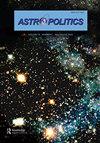Competition Among Spacefaring States in the Exploration of ‘Terra Nulius’ in Outer Space: A Neorealist Approach
Q3 Social Sciences
引用次数: 0
Abstract
ABSTRACTThis paper aims to explain the competition among spacefaring states in outer space. In contrast to rivalry among great powers on Earth, the competition in space does not merely reflect the situation on Earth. Spacefaring states tend to put their preferences to the most beneficial stakeholders possible. The United States, as the current hegemon in space exploration, has to share its partners on Earth, for instance, the European States, with rival states, such as China. Through a neorealist approach and secondary data collected from various sources, this paper advances that in line with the neorealist assumption, neither ideology nor traditional alliance shapes the international political posture, but rather rational consideration and ability to maximize national interests. In the end, this paper shows that the behavior among states in terms of space exploration related to defence is more varied, unlike the pattern of military competition that occurs on Earth. Choices and changes in the power structure in space are possible based on capability and strategic actions among competing spacefaring states. Disclosure statementNo potential conflict of interest was reported by the authors.Notes1 Freddie Wilkinson, “The History of Space Exploration”, National Geographic, https://www.nationalgeographic.org/article/history-space-exploration/ (accessed November 3, 2022).2 John Hickman, “Research Viewpoint: International Relations and the Second Space Race Between the United States and China,” Astropolitics 17, no. 3 (2019): 178–190.3 Dandy B Bramasta, “NASA Ungkap Penemuan Air di Permukaan Bulan, Apa Artinya?,” Kompas.com, last update October 27, 2020, https://www.kompas.com/tren/read/2020/10/27/192900665/nasa-ungkap-penemuan-air-di-permukaan-bulan-apa-artinya-?page=all (accessed December 20, 2022).4 “Chapter 5. Crowding and Competition in Space,” Global Risks Report 2022, World Economic Forum, last modified January 11, 2022, https://www.weforum.org/reports/global-risks-report-2022/in-full/chapter-5-crowding-and-competition-in-space (accessed November 3, 2022).5 Hickman, “Research Viewpoint,” 178–179.6 Rubab Nawaz, Asma Bilal & Maria Rehman, “United States-China Space Offensive: A Dangerous Competition” Astropolitics 20, no. 1 (2022): 27–42.7 Everett C Dolman, Astropolitik: Classical Geopolitics in the Space Age, 1st ed (Routledge, 2001).8 Ajey Lele, Asian Space Race: Rhetoric or Reality? (India: Springer India, 2013).9 Ajey Lele, “Space Security Dilemma: India and China” Astropolitics 17, no. 1 (2019): 23–37.10 Nils Holger Schreiber, “Man, State, and War in Space: Neorealism and Russia’s Counterbalancing Strategy Against the United States in Outer Space Security Politics” Astropolitics 20, no. 2–3 (2022): 151–174.11 “Space Law Treaties and Principles,” International Space Law: United Nations Instruments, United Nations Office for Outer Space Affairs (UNOOSA), 2017, https://www.unoosa.org/oosa/en/ourwork/spacelaw/treaties.html, (accessed November 20, 2022).12 Trevor Brown, “Space and the Sea: Strategic Considerations for the Commons” Astropolitics 10, no. 3 (2012): 234–247.13 Ibid.14 Andrew Jones, “China Says It’s Open to Sharing Moon Rocks as Chang’e 5 Samples Head to the Lab,” Space.com, last modified December 24, 2020, https://www.space.com/china-sharing-chang-e-5-moon-samples (accessed November 1, 2022).15 National Security Council Report, “Statement of Preliminary US Policy on Outer Space”, Foreign Relations of The United States, 1958–1960, United Nations And General International Matters, Volume II, Washington, August 18, 1958, https://history.state.gov/historicaldocuments/frus1958-60v02/d442 (accessed November 2, 2022).16 David Caesar Wani, “The Struggle for Power, Profits and Prestige in the International System,” Modern Diplomacy, March 13, 2020, https://moderndiplomacy.eu/2020/03/13/the-struggle-for-power-profits-and-prestige-in-the-international-system/ (accessed October 20, 2022).17 Kenneth N. Waltz, “Theory of International Politics” (Waveland Press: 1979).18 Mearsheimer, op. cit.19 “Countries with Space Programs 2023,” World Population Review, https://worldpopulationreview.com/country-rankings/countries-with-space-programs (accessed January 30, 2023).20 John J Mearsheimer, The Tragedy of Great Power Politics (New York: Norton, 2001).21 Jack S Levy, “What do Great Powers Balance Against and When?” in Balance of Power : Theory and Practice in the 21st Century, eds. T. V., Paul, James J., Wirtz, and Michel Fortmann (California: Stanford University Press, 2004).22 Statement of Lord Palmerston 1784–1865, British statesman; Prime Minister, 1855–8, 1859–65, in Susan Ratcliffe, Oxford Essential Quotations, 4th ed (Oxford University Press, 2016) https://www.oxfordreference.com/display/10.1093/acref/9780191826719.001.0001/q-oro-ed4–00008130;jsessionid=AE6BA3D9D29261BDA499D1EFABCF3B96 (accessed November 18, 2022).23 Hickman, “Research Viewpoint,” op. cit.航天国家在探索外太空“零地”中的竞争:一种新现实主义的方法
摘要本文旨在解释航天国家在外太空的竞争。与地球上大国之间的竞争不同,太空竞争不仅仅反映了地球上的情况。航天国家倾向于把他们的偏好放在最有利的利益相关者身上。作为目前太空探索领域的霸主,美国不得不与中国等竞争对手分享其在地球上的伙伴,例如欧洲国家。本文通过新现实主义的研究方法和从各种来源收集的二手数据,提出根据新现实主义的假设,决定国际政治态势的不是意识形态,也不是传统的联盟,而是国家利益最大化的理性考虑和能力。最后,本文表明,与地球上发生的军事竞争模式不同,国家之间在与国防相关的太空探索方面的行为更加多样化。空间权力结构的选择和变化可能取决于相互竞争的航天国家之间的能力和战略行动。披露声明作者未报告潜在的利益冲突。注1弗雷迪·威尔金森,“太空探索的历史”,国家地理,https://www.nationalgeographic.org/article/history-space-exploration/(访问日期为2022年11月3日)约翰·希克曼,“研究视角:国际关系与中美第二次太空竞赛”,《天体政治》第17期,第2期。Dandy B Bramasta,“NASA unkap Penemuan Air di Permukaan Bulan, Apa Artinya?”,“Kompas.com,最后一次更新于2020年10月27日,https://www.kompas.com/tren/read/2020/10/27/192900665/nasa-ungkap-penemuan-air-di-permukaan-bulan-apa-artinya-?page=all(访问于2022年12月20日)“第五章。4 .《空间拥挤与竞争》,《2022年全球风险报告》,世界经济论坛,最近一次修改于2022年1月11日,https://www.weforum.org/reports/global-risks-report-2022/in-full/chapter-5-crowding-and-competition-in-space(访问于2022年11月3日)Rubab Nawaz, Asma Bilal和Maria Rehman,“美中太空攻势:一场危险的竞争”,《天体政治》,第20期,第176 - 176页。7 .杜尔曼:《天体政治学:太空时代的古典地缘政治》,第1版(劳特里奇出版社,2001)亚洲太空竞赛:修辞还是现实?(印度:Springer India, 2013).9Ajey Lele,“太空安全困境:印度和中国”,《天体政治》第17期。李晓明,“人、国家与太空战争:新现实主义与俄罗斯在太空安全政治中的对美制衡战略”,《太空政治》第20期。12 .“空间法条约和原则”,《国际空间法:联合国文书》,联合国外层空间事务厅,2017年,https://www.unoosa.org/oosa/en/ourwork/spacelaw/treaties.html,(访问日期:2022年11月20日)特雷弗·布朗,《空间与海洋:对公地的战略考虑》,《天体政治》第10期,第2期。15 .安德鲁·琼斯,“中国表示愿意在嫦娥五号样本前往实验室时共享月球岩石”,Space.com,最后修改于2020年12月24日,https://www.space.com/china-sharing-chang-e-5-moon-samples(访问于2022年11月1日)16 .国家安全委员会报告,“美国对外关系,1958- 1960年”,《联合国与一般国际事务》,第二卷,华盛顿,1958年8月18日,https://history.state.gov/historicaldocuments/frus1958-60v02/d442(访问日期:2022年11月2日)17 . David Caesar Wani,“国际体系中权力、利益和声望的斗争”,《现代外交》,2020年3月13日,https://moderndiplomacy.eu/2020/03/13/the-struggle-for-power-profits-and-prestige-in-the-international-system/(访问日期为2022年10月20日)Kenneth N. Waltz,《国际政治理论》(wavand出版社,1979),第18页Mearsheimer,同引文19“2023年有太空计划的国家”,《世界人口评论》,https://worldpopulationreview.com/country-rankings/countries-with-space-programs(2023年1月30日访问)约翰·J·米尔斯海默:《大国政治的悲剧》(纽约:诺顿出版社,2001),第21页杰克·S·列维:《大国制衡什么,何时制衡?》《权力平衡:21世纪的理论与实践》,主编。Paul, James J., Wirtz和Michel Fortmann(加利福尼亚:斯坦福大学出版社,2004).22帕默斯顿勋爵讲话(1784-1865,英国政治家);首相,1855 - 88,1859 - 65,Susan Ratcliffe,牛津基本语录,第4版(牛津大学出版社,2016)https://www.oxfordreference.com/display/10.1093/acref/9780191826719.001.0001/q-oro-ed4 -00008130;jsessionid=AE6BA3D9D29261BDA499D1EFABCF3B96(访问日期为2022年11月18日)希克曼,<研究观点>,同上。
本文章由计算机程序翻译,如有差异,请以英文原文为准。
求助全文
约1分钟内获得全文
求助全文
来源期刊

Astropolitics
Social Sciences-Political Science and International Relations
CiteScore
1.20
自引率
0.00%
发文量
2
期刊介绍:
Astropolitics: The International Journal of Space Politics and Policy is a peer-reviewed academic journal. The journal is dedicated to policy relevant and interdisciplinary analysis of civil, commercial, military, and intelligence space activities. Committed to the highest editorial standards, Astropolitics is the international journal of choice for the academic, policy-maker and professional in the space community.
 求助内容:
求助内容: 应助结果提醒方式:
应助结果提醒方式:


